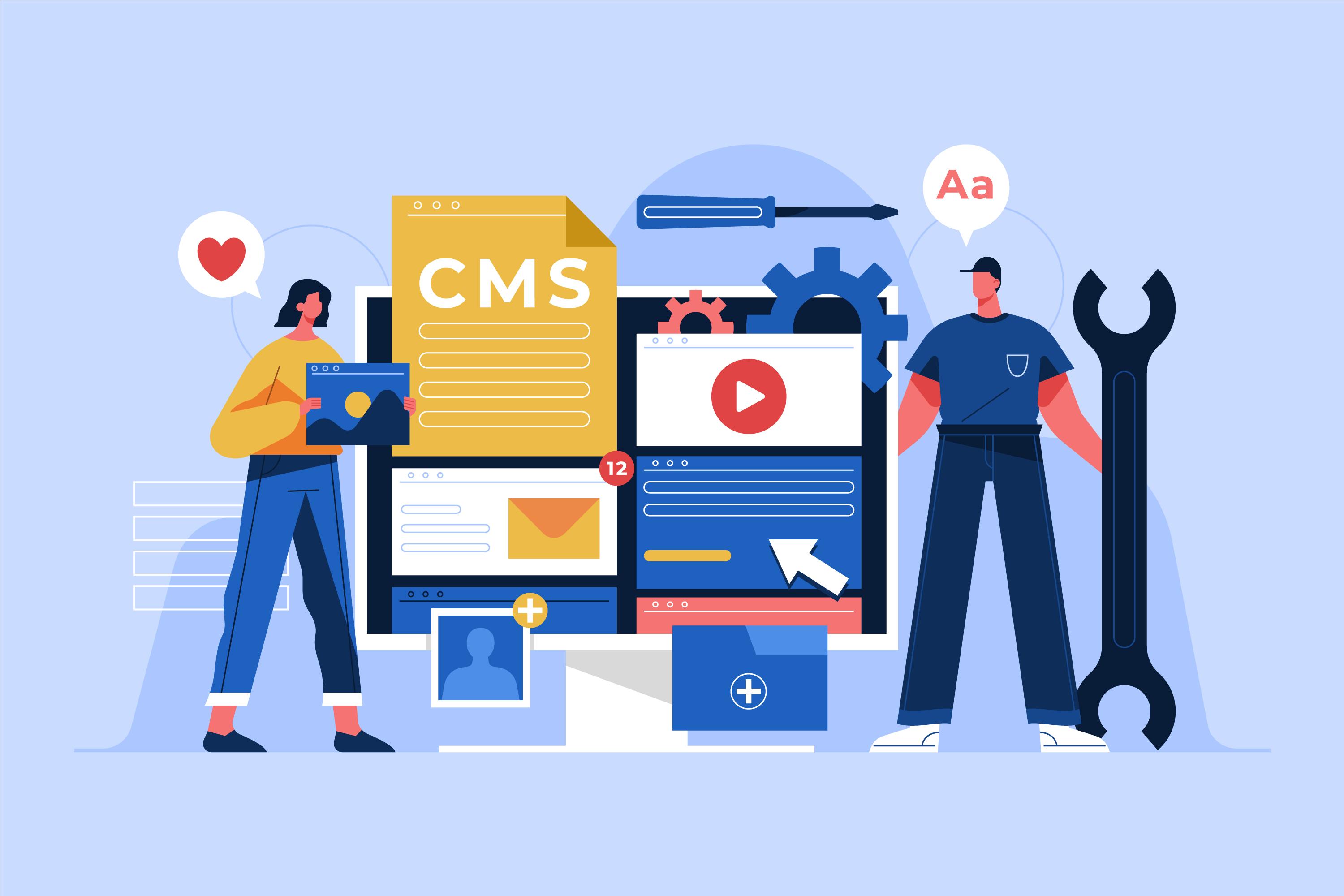Our Content Management System (CMS) solutions provide a robust platform for organizing, controlling, and publishing digital content. We recognize that businesses rely heavily on their online presence to engage customers, deliver services, and build brand identity, making efficient content management essential for businesses of all sizes. A robust CMS is key to effective digital content management, with popular platforms like WordPress, Drupal, Joomla, and Magento offering functionalities such as content creation, editing, publishing, and version control, which are crucial for maintaining a dynamic online presence.

CMS with Techcanvas Innovation
Before initiating the design and development process, it’s essential to identify the core features a CMS should offer:
- User Management: Manage user roles and permissions.
- Content Creation and Editing: WYSIWYG editors for seamless content creation and editing.
- Content Organization: Tools for categorizing and tagging content.
- Media Management: Handling images, videos, and other media assets.
- Publishing Workflow: Drafting, reviewing, and publishing capabilities.
- SEO Tools: Optimize content for search engines.
- Customization and Extensibility: Plugin and extension support.
- Security: Robust security features to protect content and user data.
- Analytics and Reporting: Tools to monitor content performance.
Designing a CMS
Requirement Analysis
Understanding business-specific needs is the first step. We engage with stakeholders to gather requirements and identify key considerations, including content type, user base, workflow, and integration needs.
Architecture Design
We design CMS architecture with a focus on scalability, reliability, and performance. Typically, a CMS follows a three-tier architecture:
- Presentation Tier: The user interface layer.
- Application Tier: The business logic layer.
- Data Tier: The database layer.
Using a modular approach allows different components (e.g., user management, content editing) to function independently while integrating seamlessly.
User Interface Design
We focus on creating an intuitive, user-friendly interface. User research informs the design process to meet the needs of content creators, editors, and administrators. Wireframes and prototypes visualize the design before development.
Database Design
We design the database schema to store content, user data, metadata, and configurations. The schema supports efficient data retrieval and flexibility for future updates.
Developing a CMS
Techcanvas Innovation’s Technology Stack
The technology stack is selected based on project needs:
- Front-end: HTML, CSS, JavaScript, and frameworks like React or Angular for a responsive UI.
- Back-end: PHP, Python, or Node.js with frameworks such as Laravel, Django, or Express.js.
- Database: MySQL, PostgreSQL, or NoSQL databases like MongoDB for data management.
Set Up a Development Environment
We establish a version control system (e.g., Git) and coding standards, along with a project management tool to track progress.
Building Core Modules
Development of core CMS modules includes:
- Authentication and Authorization: User authentication and role-based access control.
- Content Management: Features for content creation, editing, and organization.
- Media Management: Tools for uploading and managing media files.
- Workflow Management: Implement content drafting, reviewing, and publishing workflows.
Integrating SEO Tools
SEO tools are integrated to help users optimize content for search engines, including managing meta tags, generating sitemaps, and analyzing keywords.
Security Measures
Robust security measures are implemented to protect against vulnerabilities such as SQL injection, cross-site scripting (XSS), and cross-site request forgery (CSRF), alongside data encryption and regular audits.
Testing
Comprehensive testing ensures CMS functionality:
- Unit Testing: Testing individual components.
- Integration Testing: Ensuring component interoperability.
- User Acceptance Testing (UAT): Validating the system with end-users.
Deployment and Maintenance
Deployment
The CMS is deployed to a production environment, utilizing CI/CD pipelines to automate deployment and streamline updates.
Training and Documentation
We provide user and admin training, along with comprehensive documentation for CMS usage, administration, and maintenance.
Maintenance and Updates
Regular CMS updates address security vulnerabilities, bug fixes, and feature additions. System performance and user feedback are monitored to ensure continuous improvement.
- User Roles: Manage user permissions effectively.
- Content Editor: WYSIWYG editors for intuitive content creation.
- Organizational Tools: Options for categorizing and tagging content.
- Media Management: Easy handling of images, videos, and documents.
- Publishing Workflow: Streamlined drafting, reviewing, and publishing process.
- SEO Optimization: Tools to improve content visibility on search engines.
- Custom Plugins: Add plugins and extensions as needed.
- Enhanced Security: Advanced protection features for data safety.
- Analytics and Reporting: Track content performance and engagement.
- System Architecture: Building a scalable, secure structure with clear data, application, and presentation layers.
- User Interface: Creating a user-friendly interface through research and prototyping.
- Database Structure: Designing a flexible database to manage content, user data, and configurations.
- Front-end: HTML, CSS, JavaScript, along with React or Angular frameworks.
- Back-end: Technologies like PHP, Python, and Node.js, with frameworks like Laravel, Django, or Express.js.
- Database: Relational databases like MySQL, PostgreSQL, and NoSQL options like MongoDB.
- Setup: Configuring development environments and establishing coding standards.
- Core Modules: Building essential features like authentication, content and media management, and workflow tools.
- SEO Features: Adding SEO tools for optimization, such as meta tags and sitemaps.
- Security: Implementing stringent security measures to ensure data protection.
- Unit Testing: Ensuring each component functions as expected.
- Integration Testing: Verifying seamless interaction between various modules.
- User Acceptance Testing: Validating usability and functionality with end-users.
- Custom CMS development tailored to specific needs.
- Integration with CMS platforms like WordPress, Drupal, and Joomla.
- CMS consulting for platform selection and workflow optimization.
- Custom theme development and branding alignment.
- Content migration from static sites or other CMS platforms.
- Training and ongoing support for administrators and content editors.
- WordPress: For blogs, small business sites, and e-commerce.
- Drupal: Ideal for complex, large-scale websites.
- Joomla: Versatile for a range of website types, including e-commerce.
- Custom CMS solutions for specific business requirements.
- Ease of use: Easily update and publish content.
- Efficiency: Streamline content workflows.
- Scalability: Expand features and content seamlessly.
- SEO advantages: Tools to improve search visibility.
- Cost savings: Reduce maintenance and external dependencies.
